Free proxies are not safe to use! (unless with caution)
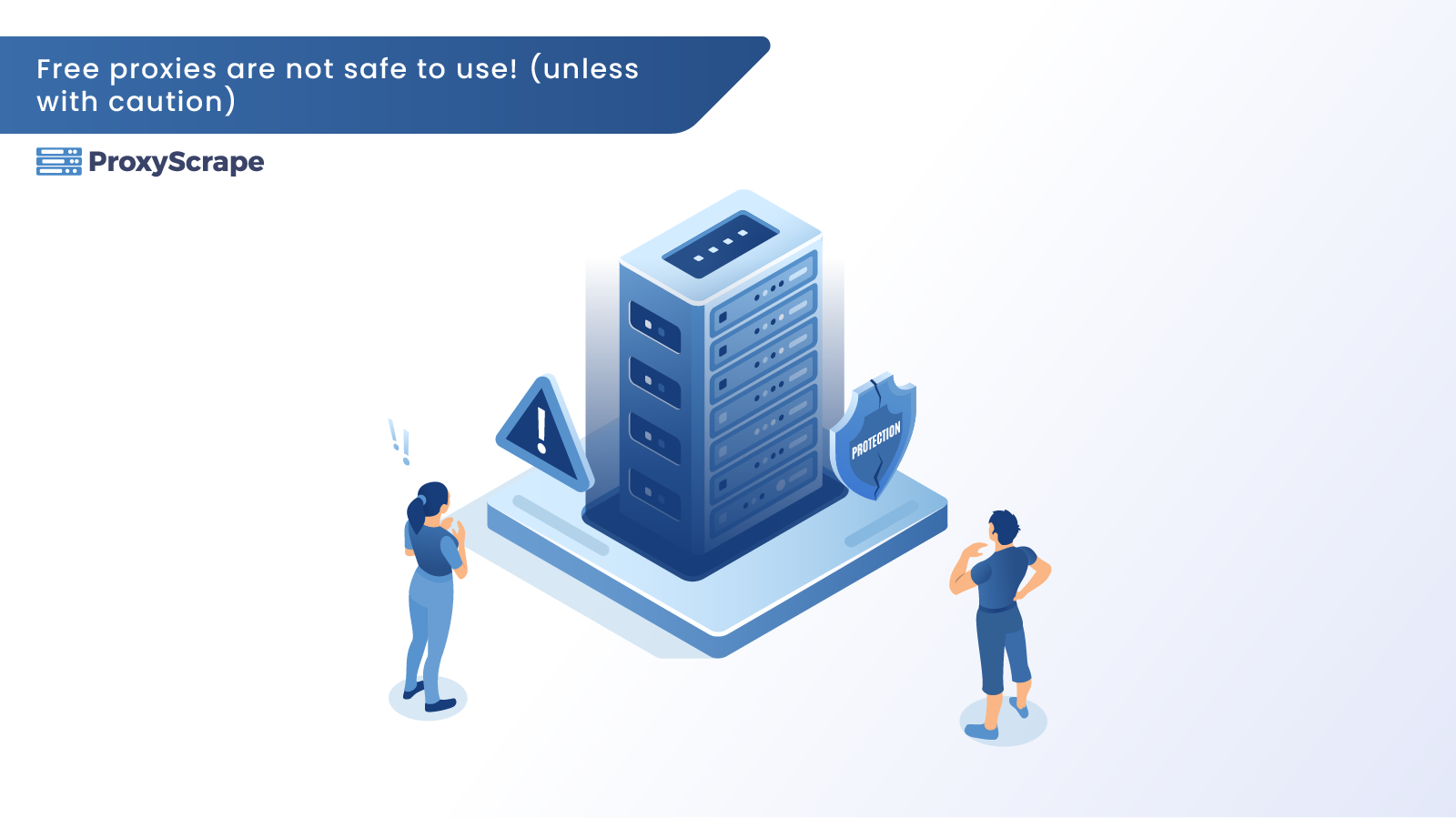
We here at ProxyScrape have been providing a free proxy list for quite a while now, but admittingly we have to say that free proxies aren’t always safe to use. This is because free proxies do not always provide the anonymity you did expect while browsing the internet and might be malicious. They can be
We here at ProxyScrape have been providing a free proxy list for quite a while now, but admittingly we have to say that free proxies aren’t always safe to use. This is because free proxies do not always provide the anonymity you did expect while browsing the internet and might be malicious. They can be malicious in various ways, such as by injecting ads, tracking your activities, and logging your data such as phone numbers, emails, and location.
In most cases, you will be better off with alternatives such as datacenter proxies or residential proxies, which are maintained by professionals with no malicious intent.
In this article, we will go more in-depth into how public proxies might be unsafe to use.
Proxy anonymity levels
For some people, proxy anonymity matters a great deal because they do not want their original identity revealed.
There are three types of anonymity levels:
- Transparent proxy: does not hide your IP Address.
- Anonymous proxy: hides your IP address but does reveal that you are using a proxy server.
- Elite proxy: hides both your IP address and the fact that you are using a proxy server at all.
Transparent proxies are a significant problem when it comes to free proxies, especially with HTTP proxies. Analytics on the public HTTP proxies that we have checked show that at least 55% of the proxies are transparent. Transparent proxies will show your original IP address to the target. 6% of the public HTTP proxies are anonymous and will show to the target that you are connected via a proxy. Only 39% of the shared proxies are elite and will not reveal any traces to your target that you are hiding behind a proxy.
When you want to stay anonymous, make sure to only use elite proxies!
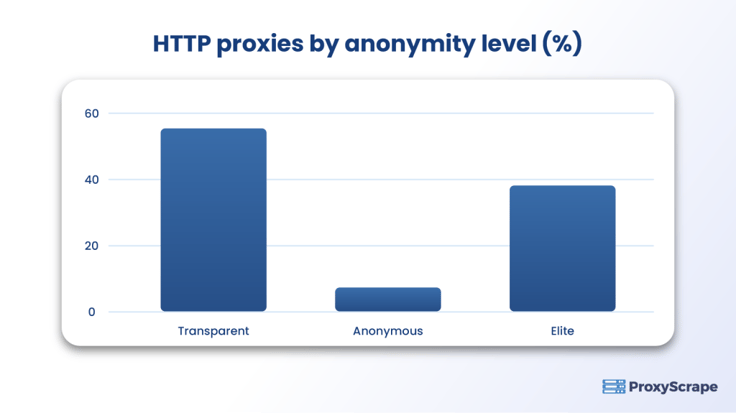
Traffic manipulation & modification
People who host a proxy can modify the content you see when visiting a website. These modifications can be malicious.
Research shows that 38.21% of all HTTP proxies perform some sort of content modification. Luckily only 5.15% are malicious.
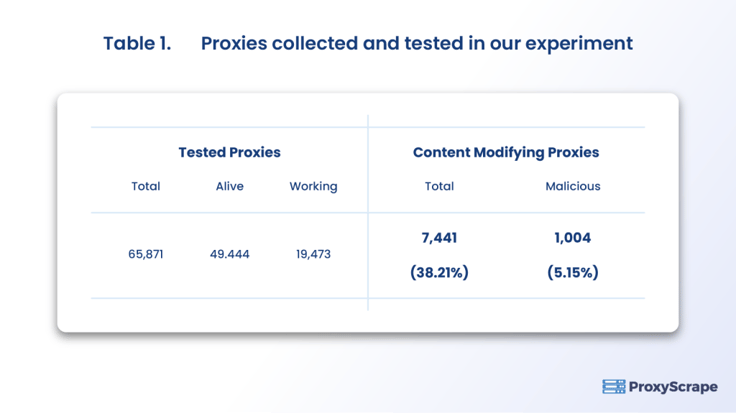
Forms of non-malicious proxy content modification:
- Blocking of ads and trackers
- Website caching
Forms of malicious proxy content modification:
- Injecting or replacing advertisements
- Collecting user information such as location, email, phone number
- Tracking mouse/keyboard
- Tracking with cookies
- Requesting unsafe sites
When you use a public proxy, you must stay aware that the proxy you are using might be modifying what you see on the website. Some of the modifications that proxies make might be more malicious than others.
Additional problems with public proxies
Public proxy lifespan
As you already know, public proxies get used by a tremendous amount of users; this causes a lot of load on the proxy servers. Research done by the University of Washington estimates that each public proxy could be using up to 300 MB of data per second. As a result, most open proxies’ lifespan is very short since it is very resource-intensive to operate one. It is estimated that the median lifespan of a free proxy is only seven days long.
Blacklisting of public proxies
Another huge problem with public proxies is that they get blacklisted very quickly from known websites.
There are two main reasons for this:
- The websites use a service to detect proxy usage. Since the proxies are public for everyone, this is very easy to detect. The websites can do this with services such as MaxMind.
- The proxies get used a lot for the website by other people, and they get blocked from accessing it.
Since free proxies are blacklisted quickly from many targets, they may not be of great use to you, and you might want to look at their alternatives.
Alternatives to free proxies
Since free proxies aren’t the best choice most of the time, what should you choose? It, of course, depends on your use-case.
There are two main types of other proxy categories:
- Datacenter proxies: maintained by professionals in a datacenter
- Residential proxies: residential IPs combined in a proxy network
When should you use them?
When you should choose datacenter proxies
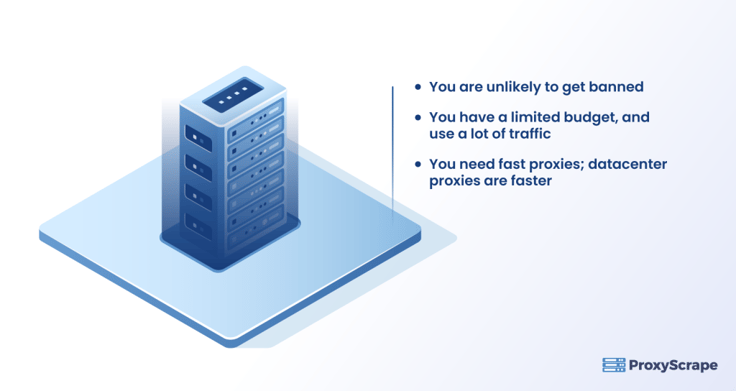
Datacenter proxies are maintained by professionals and generally have a faster response time and greater bandwidth than their alternatives.
Most datacenter proxy providers price their service by the number of proxies you buy instead of by the traffic you consume.
Here are some scenarios you should consider datacenter proxies:
- Your target is very unlikely to ban you quickly on a specific IP address.
- You use a lot of traffic and have a limited budget. Datacenter proxies often come with unlimited or cheaply priced traffic.
When you should choose residential proxies
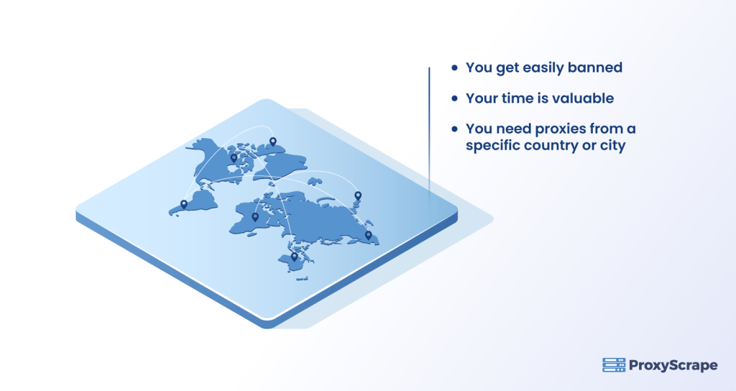
Residential proxies are the more expensive and are often priced by the amount of traffic you consume, but you are less likely to be banned.
You should choose residential proxies in one of the following scenarios:
- Your target website quickly bans you when bot traffic is detected.
- Your time is valuable, and you can not afford to be blocked for a long time.
- You need proxies from a specific country or city which are not provided by datacenter proxies.
Other advantages of residential proxies:
- You get access to a pool of millions of IP addresses all around the world.
- Your target does not know you are using a proxy, and it thinks you are a regular user.
Conclusion
In most cases, we would suggest against using free public proxies and go with alternatives like datacenter proxies or residential proxies instead. The reason being that most free proxies are not safe is because they are either not anonymous or are performing something malicious with your browsing activity.